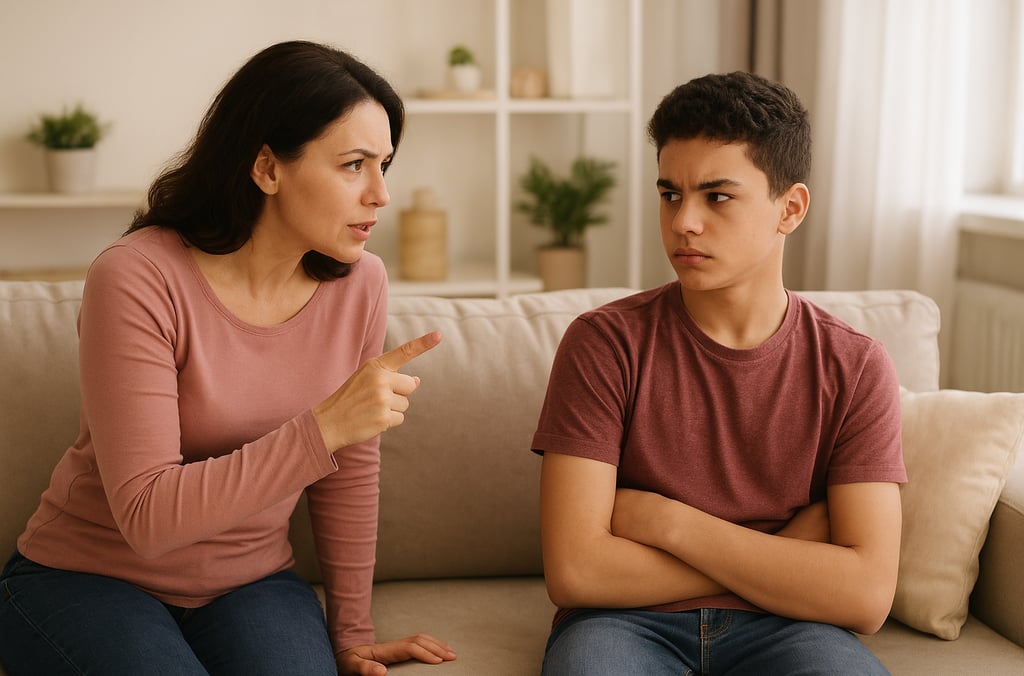Positive vs. respectful parenting
Respectful parenting goes beyond positive parenting: it's not about abuse; it's about teaching roles, hierarchy, and respect. In this article, based on my experience as a psychologist and mother, I reflect on how to prepare children to be independent, useful in society, and capable of living responsibly.
ARTICLE
Lic. Arlenys Garcia
8/26/20253 min read


In recent years, there’s been a lot of talk about positive parenting. And let me be clear, I’m not against the idea: it’s about raising children without violence, with discipline that builds, with patience, and with empathy. Up to that point, everything sounds great. The problem is when many people confuse positive parenting with “let the child do whatever they want because poor thing, we don’t want to traumatize them.”
As a psychologist, but also as a mother, I’ve learned that respectful parenting is much more than avoiding mistreatment: it’s teaching that in a family everyone has a role, responsibilities, and that there must be hierarchy at home. Because yes, the house belongs to the parents, and even if the children are teenagers or adults, as long as they live under that roof there are rules they must respect.
Let’s break it down…
Positive parenting seeks for children to feel safe, motivated, and recognized, and focuses a lot on reinforcing what they do well. It’s very oriented to the present: daily accompaniment, correcting without yelling, explaining calmly, guiding with love.
Respectful parenting, on the other hand, includes all of that but goes further: it recognizes that respect for parents and authority is non-negotiable. It’s not about irrational fear, but about that inner voice that says: “I know my mom or dad wouldn’t allow this”—that stops you, even if they’re not around. I remember that in my house there were clear rules, and I wouldn’t dare ask the same thing twice: if my mother said “no,” it was no. Period.
Today I see many young people constantly challenging their parents, ignoring boundaries, and believing they can decide everything inside the home they live in… when they don’t even contribute to the groceries! That’s not respect, that’s disorder.
The problem of eternal dependence
In the Dominican Republic, we have a very curious phenomenon: many young adults don’t want to become independent. They prefer to stay “stuck” in their parents’ home, even past 25, 30, or older. And of course, if parents never taught them independence, how are they going to take that step?
In therapy I often hear:
—“My son is 27, doesn’t work, doesn’t study, and says he won’t leave the house because here he has everything.”
And I think: Who gave him everything? Who never taught him real responsibility? Respectful parenting seeks exactly the opposite: to raise children who can fly on their own, not eternal chicks stuck in the nest because they don’t even know how to use a stove.
Respect!!!
Respect means understanding that every family has rules, and those rules are not “whims,” but structures that shape character.
A simple example:
—If parents say you can’t come home after midnight, it’s not “I felt like it, so I came back at 3.”
Because if children don’t learn to obey rules at home, how will they do it outside—in a job, in a relationship, or in life itself?
And here’s another key point: we’re not just raising children for ourselves, we’re raising them for society. At home, the authority is the parents. But in life, there are authorities of the country to respect, bosses at work, teachers at university, and laws everywhere. If we don’t teach respect for hierarchy and norms at home, we end up raising children who won’t know how to live with others or contribute to the community they belong to.
I remember…
In my house, curse words were not allowed (not even a tiny one was permitted). Respect was in the air. I knew that even if my mom wasn’t there, if someone told her that I had said a bad word or done something wrong, “divine justice” was waiting for me when I got home. And that was enough to keep me from trying.
Today I see young people answering their parents as if they were street buddies. And sometimes I laugh (with concern) because I think: “If I had answered my mother like that, I’d still be picking my teeth up off the floor.” Of course, I’m not saying that was the right method, but there was a clear limit back then. And that limit is what many homes are losing today.
So, what do I propose?
A balance between positive parenting and respectful parenting. Raising with love, patience, and empathy—but without forgetting that parents are the authority. It is non-negotiable that children respect household rules. And part of loving our children is teaching them to be independent, even if that means watching them fly out of the nest earlier than we’d like.
Because in the end, parenting is not just about protecting: it’s about preparing our children so they can live their own lives with responsibility, respect, and the ability to contribute something positive to society.
Lic. Arlenys Garcia
Mental Health is a priority.
Close, practical and emotionally transforming psychology.
Need help or have questions?
Write or call us with confidence:
📞 +1 849 354 2905
✉️ info@zenitpsychology.com
© 2025 Zenit Psychology. All rights reserved.
Your data is protected. We do not share your information with third parties.
